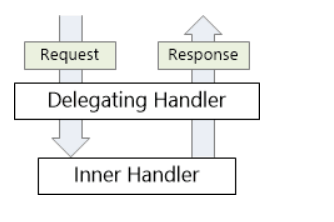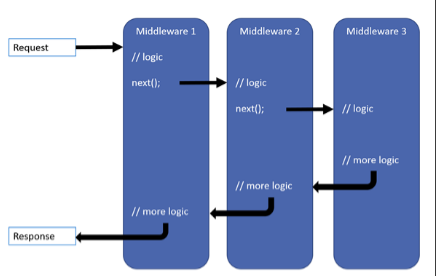您好,登錄后才能下訂單哦!
您好,登錄后才能下訂單哦!
怎么在Asp.Net Core中使用NLog實現請求監控?很多新手對此不是很清楚,為了幫助大家解決這個難題,下面小編將為大家詳細講解,有這方面需求的人可以來學習下,希望你能有所收獲。
一:比較 asp.net web api 和 asp.net core 的請求管道


觀察這兩張圖,可以發現他們非常的相似,都是管道式的設計,在 asp.net web api 中,我們可以注冊一系列的 DelegatingHandler 來處理請求上下文 HttpRequestMessage,在 asp.net core 中,我們可以注冊一系列中間件來處理請求上下文,他們兩者從功能和意義上是非常相似的,我這里這里不會詳細介紹各自的管道是如何的(這樣的文章非常多,博客園隨處可見),他們都完成了類似中間件的功能,只是在代碼設計上有一點區別。
我們先看一段代碼,新建一個 asp.net web api 項目,添加幾個 DelegatinHandler
然后在 Global 中注冊
public class DelegatingHandler1 : DelegatingHandler
{
protected override async Task<HttpResponseMessage> SendAsync(HttpRequestMessage request, CancellationToken cancellationToken)
{
Trace.WriteLine("DelegatingHandler1 HashCode: " + this.GetHashCode());
Trace.WriteLine("DelegatingHandler1 base InnerHandler HashCode: " + base.InnerHandler.GetHashCode());
Trace.WriteLine("DelegatingHandler1 start");
var response = await base.SendAsync(request, cancellationToken);
Trace.WriteLine("DelegatingHandler1 end");
return response;
}
}
public class DelegatingHandler2 : DelegatingHandler
{
protected override async Task<HttpResponseMessage> SendAsync(HttpRequestMessage request, CancellationToken cancellationToken)
{
Trace.WriteLine("DelegatingHandler2 HashCode: " + this.GetHashCode());
Trace.WriteLine("DelegatingHandler2 base InnerHandler HashCode: " + base.InnerHandler.GetHashCode());
Trace.WriteLine("DelegatingHandler2 start");
var response = await base.SendAsync(request, cancellationToken);
Trace.WriteLine("DelegatingHandler2 end");
return response;
}
}
public class DelegatingHandler3 : DelegatingHandler
{
protected override async Task<HttpResponseMessage> SendAsync(HttpRequestMessage request, CancellationToken cancellationToken)
{
Trace.WriteLine("DelegatingHandler3 HashCode: " + this.GetHashCode());
Trace.WriteLine("DelegatingHandler3 base InnerHandler HashCode: " + base.InnerHandler.GetHashCode());
Trace.WriteLine("DelegatingHandler3 start");
var response = await base.SendAsync(request, cancellationToken);
Trace.WriteLine("DelegatingHandler3 end");
return response;
}
}修改一下 ValuesController
public class WebApiApplication : System.Web.HttpApplication
{
protected void Application_Start()
{
AreaRegistration.RegisterAllAreas();
GlobalConfiguration.Configure(WebApiConfig.Register);
FilterConfig.RegisterGlobalFilters(GlobalFilters.Filters);
RouteConfig.RegisterRoutes(RouteTable.Routes);
BundleConfig.RegisterBundles(BundleTable.Bundles);
GlobalConfiguration.Configuration.MessageHandlers.Add(new DelegatingHandler1());
GlobalConfiguration.Configuration.MessageHandlers.Add(new DelegatingHandler2());
GlobalConfiguration.Configuration.MessageHandlers.Add(new DelegatingHandler3());
}
}啟動后輸入路徑 /api/values,我們可以在VS 的輸出欄看到下面這些內容
public class ValuesController : ApiController
{
// GET api/values
public IEnumerable<string> Get()
{
Trace.WriteLine("/api/values");
var handlers = this.RequestContext.Configuration.MessageHandlers;
return new string[] { "value1", "value2" };
}
}啟動后輸入路徑 /api/values,我們可以在VS 的輸出欄看到下面這些內容
DelegatingHandler1 HashCode: 58154627
DelegatingHandler1 base InnerHandler HashCode: 35529478
DelegatingHandler1 start
DelegatingHandler2 HashCode: 35529478
DelegatingHandler2 base InnerHandler HashCode: 47422476
DelegatingHandler2 start
DelegatingHandler3 HashCode: 47422476
DelegatingHandler3 base InnerHandler HashCode: 65273341
DelegatingHandler3 start
/api/values
DelegatingHandler3 end
DelegatingHandler2 end
DelegatingHandler1 end
輸出中我們可以看到 DelegatingHandler1 的 InnerHandler 是 DelegatingHandler2,以此類推,在 DelegatingHandler3 的 InnerHandler 處理請求的時候就轉發到了相關控制器,這里和 .net core 中的中間件非常相似,在.net core 中間件順序是 RequestServicesContainerMiddleware(給請求上下文綁定容器)-> AuthenticationMiddleware(認證)-> RouterMiddleware (路由以及MVC)
如果我們在 ValuesController 中觀察表達式 this.RequestContext.Configuration.MessageHandlers 還可以看到最終處理請求的是一個 HttpRoutingDispatcher,最也是是分配到路由以及控制器來處理的,按照如此方式我們可以很容易在 asp.net web api 中對請求統計。這里是比較簡陋的,對此我們可以記錄客戶端和服務器更詳細的信息,包括 IP 地址,http狀態碼,是否是認證用戶等等,但是這篇主要是以 asp.net core 為主的,所以這里就不詳細寫下去了。
public class ApplicationInsight : DelegatingHandler
{
protected override async Task<HttpResponseMessage> SendAsync(HttpRequestMessage request, CancellationToken cancellationToken)
{
var stopWatch = new Stopwatch();
stopWatch.Start();
var response = await base.SendAsync(request, cancellationToken);
stopWatch.Stop();
//停止計時器,并記錄
}
}
public partial class Startup
{
public void Configuration(IAppBuilder app)
{
GlobalConfiguration.Configuration.MessageHandlers.Add(new ApplicationInsight());
}
}二:asp.net core 中間件 + NLog 實現請求監控
先看統計結果,start 開始時間,time 是請求消耗時間(毫秒),authenicate 是認證通過的 schema,使用 NLog 自定義字段也是非常方便的

先說一說遇到的問題
(1)NLog 記錄一張以上的表如何實現,應為首先會有一個一般性的日志表(稱他為 log),并且這些統計不對寫到 log 表
(2)使用 NLog 自定義字段 LayoutRenderer 沒有類似 .net framework 中的 System.Web.Current
(3)使用 UseMiddleware 無法在讓我們的中間件成為第一個中間件
(4)實現忽略記錄的方法,肯定有一些接口是不希望記錄的,所以這個也要實現
NLog 配置
這里只列出了部分內容,github 地址在最后,數據庫是 mysql ,apiinsight 表示請求統計,log 是一般性的日志,debughelper 可以加快我們調試時日志的檢索速度
<targets>
<!--黑洞 忽略的日志-->
<target xsi:type="Null"
name="blackhole" />
<!--文件日志-->
<target xsi:type="File"
name="debughelper"
fileName="${var:root}\Logs\debug_helper.log"
layout="${longdate}|${event-properties:item=EventId.Id}|${logger}|${uppercase:${level}}|${message} ${exception}" />
<!--apiinsight api 統計-->
<target name="apiinsight" xsi:type="Database"
dbProvider="MySql.Data.MySqlClient.MySqlConnection, MySql.Data"
connectionString="${var:connectionString}"
>
</target>
<!--日志-->
<target name="log" xsi:type="Database"
dbProvider="MySql.Data.MySqlClient.MySqlConnection, MySql.Data"
connectionString="${var:connectionString}"
>
</target>
</targets>在 Startup 中
public void Configure(IApplicationBuilder app, IHostingEnvironment env)
{
//省略了其他配置
//全局的 HttpContext
app.UseGlobalHttpContext();
//省略了其他配置
LogManager.Configuration = new XmlLoggingConfiguration(Path.Combine(env.ContentRootPath, "nlog.config"));
LogManager.Configuration.Variables["root"] = env.ContentRootPath;
LogManager.Configuration.Variables["connectionString"] = Configuration.GetConnectionString("DefaultConnection");
}自定義字段都是通過 LayoutRenderer 實現,由于自定義字段有很多,這里只列出了一個開始時間是如何查詢的,這個時間是在我們注冊的第一個中間件執行 Invoke 方法的時候寫進 HttpContext.Items 的
[LayoutRenderer("apiinsight-start")]
public class StartApiInsightRenderer : LayoutRenderer
{
protected override void Append(StringBuilder builder, LogEventInfo logEvent)
{
var httpContext = HttpContextProvider.Current;
if (httpContext == null)
{
return;
}
var _apiInsightsKeys = httpContext.RequestServices.GetService<IApiInsightsKeys>();
if (httpContext != null)
{
if (httpContext.Items.TryGetValue(_apiInsightsKeys.StartTimeName, out var start) == true)
{
builder.Append(start.ToString());
}
}
}
}NLog 規則,很容易理解日志統計只記錄 Cheers 命名空間下的日志
<rules> <!--需要記錄的日志--> <logger name="Cheers.*" minlevel="Trace" writeTo="apiinsight" /> <logger name="WebApp.*" minlevel="Info" writeTo="log" /> <logger name="*" minlevel="Trace" maxlevel="Debug" writeTo="debughelper" /> <!--忽略的日志--> <logger name="Microsoft.*" minlevel="Trace" writeTo="blackhole" final="true" /> </rules>
核心 ApiInsightMiddleware 中間件
public class ApiInsightMiddleware
{
private readonly RequestDelegate _next;
private readonly IServiceProvider _serverProvider;
private readonly IApiInsightsKeys _apiInsightsKeys;
private readonly ILogger<ApiInsightMiddleware> _logger;
private HttpContext _httpContext;
public ApiInsightMiddleware(RequestDelegate next, IServiceProvider serviceProvider, ILogger<ApiInsightMiddleware> logger)
{
_next = next;
_serverProvider = serviceProvider;
_apiInsightsKeys = _serverProvider.GetService<IApiInsightsKeys>();
_logger = logger;
}
public async Task Invoke(HttpContext httpContext)
{
_httpContext = httpContext;
var flag = SetValues();
await _next(httpContext);
if (flag == true)
{
ApiInsight();
}
}
//省略了其他的代碼
}很好理解,在執行下一個中間件之前調用 SetValues 開始計時,下一個中間件執行成功開始統計并寫入日志(或者忽略不寫)。現在他是 asp.net core mvc 的第一個中間件了,好處就是更符合這個中間件本身的所做的事情了,但是帶來的問題就是 httpContext.RequestService 是 null ,因為 RequestService 是在 RequestServicesContainerMiddleware 這個中間件寫進去的,在者其實很多地方我們都需要 HttpContext ,并且目前微軟還沒有給我們定義一個靜態的 HttpContext。
靜態的 HttpContext
HttpContext 是通過單例 IHttpContextAccessor 提供的,當 HttpContext 創建的時候就會賦值給他,當請求到達中間件這個管道的時候,HttpContext 就已經存在于 IHttpContextAccessor 了,并且和 Invoke 參數列表中的 HttpContext 是一致的(同一個請求中),問題在于 RequestServicesContainerMiddleware 這個中間件沒有執行就沒有容器,并且很多時候我們都要用到容器,所以就模仿源碼在這里都加進去了。
public static class HttpContextProvider
{
private static IHttpContextAccessor _accessor;
private static IServiceScopeFactory _serviceScopeFactory;
public static Microsoft.AspNetCore.Http.HttpContext Current
{
get
{
var context = _accessor?.HttpContext;
if (context != null)
{
var replacementFeature = new RequestServicesFeature(_serviceScopeFactory);
context.Features.Set<IServiceProvidersFeature>(replacementFeature);
return context;
}
return null;
}
}
internal static void ConfigureAccessor(IHttpContextAccessor accessor, IServiceScopeFactory serviceScopeFactory)
{
_accessor = accessor;
_serviceScopeFactory = serviceScopeFactory;
}
}
public static class HttpContextExtenstion
{
public static void AddHttpContextAccessor(this IServiceCollection services)
{
services.AddSingleton<IHttpContextAccessor, HttpContextAccessor>();
}
public static IApplicationBuilder UseGlobalHttpContext(this IApplicationBuilder app)
{
var httpContextAccessor = app.ApplicationServices.GetRequiredService<IHttpContextAccessor>();
var serviceScopeFactory = app.ApplicationServices.GetRequiredService<IServiceScopeFactory>();
HttpContextProvider.ConfigureAccessor(httpContextAccessor, serviceScopeFactory);
return app;
}
}我們只需要在 Startup 中使用 app.UseGlobalHttpContext(); 就可以在程序的任何地方得到 HttpContext 和容器了,肯定會有人說為什么不通過構造函數來獲取我們想要的注入呢,因為有些第三方框架或這某些地方我們不能使用容器獲取服務,比如這里 NLog 的自定義字段使用的 LayoutRenderer 就無法通過構造器得到我們想要的服務。
第一個中間件
在 Startup 的 Configure 方法中目前還沒發現如何注冊第一個中間件,因為 Configure 方法始終是在 IStartupFilter 這個接口之后執行的,這也提供了我們讓自己的中間件成為第一個中間件的可能。可能這樣做并不是特別有必要,甚至是沒有意義的,但是實現的過程確實很有意思的。這里在 Startup 中的 方法 ConfigureService 注冊我們的中間件。
public void ConfigureServices(IServiceCollection services)
{
services.AddApiInsights();
services.AddMvc();
}具體的
public static class ApiInsightsServiceCollectionExtensions
{
static readonly string stopWatchName = "__stopwatch__";
static readonly string startTimeName = "__start__";
/// <summary>
/// 注冊和 API 監控相關的服務,中間件
/// </summary>
/// <param name="services"></param>
public static void AddApiInsights(this IServiceCollection services)
{
services.AddSingleton<IApiInsightsKeys>(
new ApiInsightsKeys(stopWatchName, startTimeName)
);
services.FirstRegister<IStartupFilter, RequestApiInsightBeginStartupFilter>(ServiceCollectionServiceExtensions.AddTransient<IStartupFilter, RequestApiInsightBeginStartupFilter>);
services.AddSingleton<IRequestIsAuthenticate, DefaultRequestIsAuthenticate>();
}
}這里注冊了三個服務
IApiInsightsKeys
定義了存儲在 HttpContext.Item 中的鍵值對的名稱
public interface IApiInsightsKeys
{
string StopWatchName { get; }
string StartTimeName { get; }
}IRequestIsAuthenticate
/// <summary>
/// 驗證請求用戶是否已經認證
/// </summary>
public interface IRequestIsAuthenticate
{
/// <summary>
/// 返回已經認證的 scheme
/// </summary>
/// <returns></returns>
Task<string> IsAuthenticateAsync();
/// <summary>
/// 返回已經認證的 用戶名
/// </summary>
/// <returns></returns>
Task<string> AuthenticatedUserName();
}就驗證而言可能不同的開發者使用的是不一樣的驗證方式,可能是基于 Asp.Net Core Authentication 中間件的認證方式,也可能是其他的比如自定義的 token,或者有一個單點登錄的服務器,又或者是 session,其實 Asp.Net Core 的 Authentication 中間件也可以幫我們實現基于 restful 的token 認證。所以就把它定義出來了,并且默認的實現就是基于 Authentication 這個中間件的。
IStartupFilter
看到他是一個非常特殊的方式來注冊的,自定義的 FirstRegister 這個方法,實際上 Asp.Net Core 內置有多個 IStartup 這樣的服務,并且都是在 Startup 的 Configure 之前執行的,所以這里一定要用這個服務來讓我們的中間件成為第一個中間件。FirstRegister 代碼也很容易理解,由于在宿主啟動之前,內部注冊了多個 IStartup,并且最后會按先后順序配置 IApplicationBuilder,所以我們只能讓第一個 StartupFilter 的 IApplicationBuilder 就注冊我們的中間件,通過改動 ServiceCollection 中服務的順序可以實現。雖然不是很有必要,但是可以從中觀察的 Startup 的 Configure方法 以及 接口StartupFilter (還有 IHostingStartup )的執行順序。
public class RequestApiInsightBeginStartupFilter : IStartupFilter
{
public Action<IApplicationBuilder> Configure(Action<IApplicationBuilder> next)
{
return builder =>
{
builder.UseMiddleware<RequestApiInsightBeginMiddleware>();
next(builder);
};
}
}忽略的方法
[AttributeUsage(AttributeTargets.Method, AllowMultiple = false, Inherited = true)]
public class NoInsightAttribute : Attribute
{
}在 ApiInsight 方法中會調用 IsIgnore 檢測該方法是否打了標簽 NoInsightAttribute,如果是那就忽略該方法,這里建議使用特性路由,原因有兩點,第一特性路由不需要使用 IActionSelector 接口重新查找匹配的方法,第二,在 restful api 中,結合特性路由和 HttpMethodAttribute 標簽可以使方法更簡潔,相同的接口名稱通過不同的請求方式達到不同的目的
private bool IsIgnore()
{
var actionDescriptor = GetSelectedActionDescriptor() as ControllerActionDescriptor;
if (actionDescriptor == null)
{
return false;
}
else
{
var noInsight = actionDescriptor.MethodInfo.GetCustomAttribute<NoInsightAttribute>();
return noInsight != null;
}
}看完上述內容是否對您有幫助呢?如果還想對相關知識有進一步的了解或閱讀更多相關文章,請關注億速云行業資訊頻道,感謝您對億速云的支持。
免責聲明:本站發布的內容(圖片、視頻和文字)以原創、轉載和分享為主,文章觀點不代表本網站立場,如果涉及侵權請聯系站長郵箱:is@yisu.com進行舉報,并提供相關證據,一經查實,將立刻刪除涉嫌侵權內容。